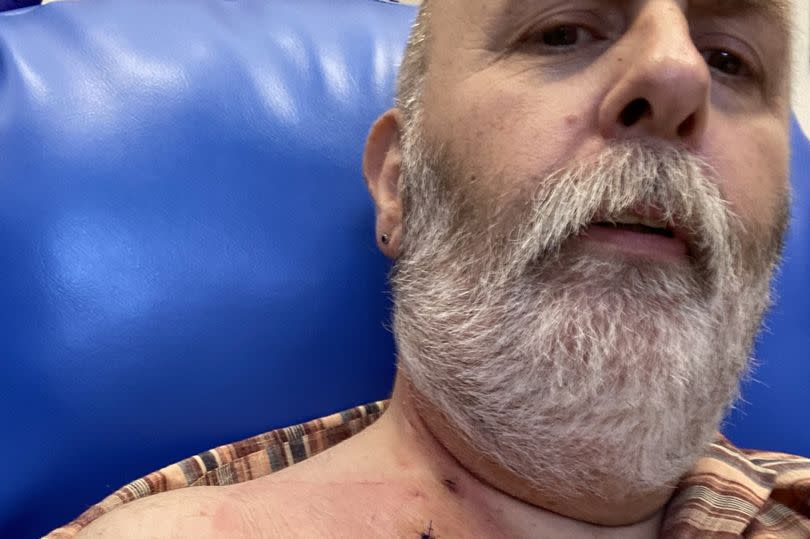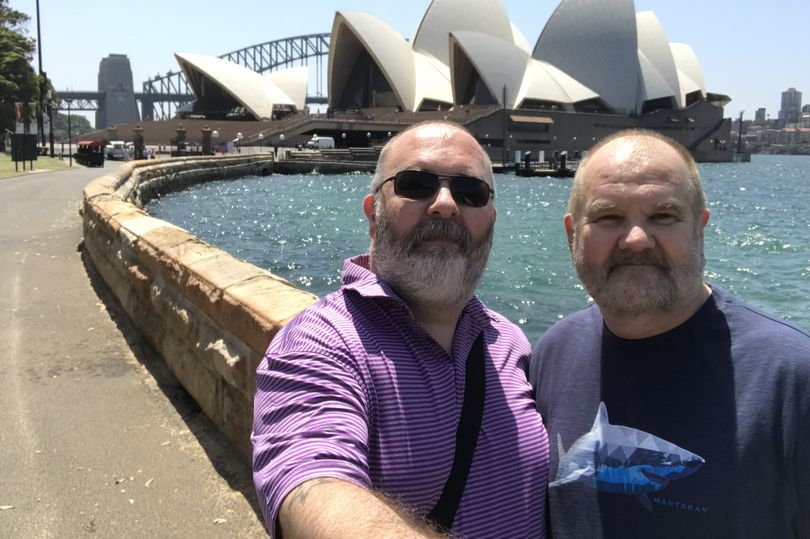A man has shared how his beloved husband died after flu-like symptoms turned out to be deadly cancer.
Brendan Hulse-Lewis had begun to feel weak in October 2023 and was unable to lift the dogs at his grooming business.
The 53-year-old, from Walsall, made an appointment with his GP after being unable to shake the symptoms for around a month.
He was given a blood test and rushed straight to A&E where he was later diagnosed with acute myeloid leukaemia (AML).
READ MORE: Reanne Coulson detectives ‘working around the clock’ to find her as new picture released
Brendan’s husband, Brian, said: “He was well built and strong but became so weak quite quickly.
“He thought he had the flu and called the doctor after about a month of symptoms but by the time the appointment came, he was almost too weak to move.

Brendan during his treatment
“The GP did a blood test and told us to go immediately to A&E.”
Brian drove Brendan straight to Walsall Manor Hospital, where he underwent more tests.
He was then diagnosed with the aggressive blood cancer which needs urgent treatment.
Every year almost 3,100 people in the UK are diagnosed with AML, and nearly 80 per cent of those diagnosed will not survive beyond five years, according to Leukaemia UK.
Brian, 72, continued: “It was without doubt the worst day of my life.
“Facing the possibility of losing the person who was my whole life and had been for 29 years.”
Brendan’s treatment started immediately with intravenous chemotherapy, along with the oral drug Midostaurin.
“The first round of chemo was very bad for him,” Brian recalled. “His body was covered in a rash, and he was constantly sick, he couldn’t keep anything down and lost 20kg in weight.
“He also lost his hair and – the bit he really hated – his beard. He’d had it since he was 22 and he said, ‘Everyone’s going to see I’ve got four chins!’”
After the third round of chemotherapy, Brendan began to get infections and then developed sepsis.
“I sat with him, he was shaking and had a temperature of 42 degrees. They were treating him with ice packs and all sorts and eventually sent me home and I thought: ‘That’s it I’m not going to see him again.’
“But they phoned me three hours later to tell me he was through it and getting better.”
Despite the challenging treatment, in spring 2024 Brendan went into remission and underwent a stem cell transplant. He was able to return home and began to recover.
However, just 35 days after the transplant, a routine blood test revealed the cancer had returned aggressively.
Brendan was given a prognosis of four to six weeks. He passed away peacefully at home on October 22 2024, surrounded by Brian, his family, and their beloved dog, Valerie.
Brian said: “We’d been together for 29 years. We had a civil partnership in 2010 and then as soon as gay marriage was legalised in England in 2014 we got married at the register office in Lichfield.
“It was a wonderful day, the weather was glorious, there was a park full of beautiful flowers next to the register office and everyone was there.
“Brendan made so many friends in hospital, and I’ve kept in touch with some. Two have had their stem cell transplants and are doing brilliantly. Of course, I wish that was Brendan, but I’m pulling for them now.
“To any family that’s got someone with leukaemia I would say keep asking questions of the doctors.
“They came out with so many long names and gave me reams of literature, but I just couldn’t take it in. If you don’t understand something, ask, because that’s part of their job.”
Dr Simon Ridley, Leukaemia UK’s Director of Research, added: “Brendan’s story is a reminder of the devastation a leukaemia diagnosis can cause.
“AML is one of the most aggressive forms of blood cancer, and survival rates have remained far too low for far too long, with a current five- year-survival rate of just 22 per cent.
“Continued investment in research is vital to developing better, more effective, treatments for AML.
“At Leukaemia UK, we are dedicated to advancing research and progress into new treatments to stop leukaemia devastating lives.”
